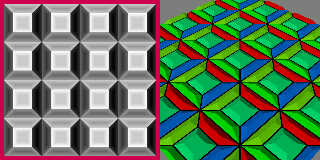|
 |
On 11/22/24 08:40, Bald Eagle wrote:
> William F Pokorny <ano### [at] anonymous org> wrote:
>> Some of the tiling pattern's patterns look pretty cool without a color
>> map - just grey. Attached tiling 21.
>>
>> Bill P.
>
> Nice!
> Are these the sort of patterns that are provided with POV-Ray - coded by Jerome
> Grimbert?
Thanks :-) Though, yes, this is Jerome's work so he deserves the credit.
Aside: In addition to the 'tiling' pattern (implementing 27
sub-tiling-patterns), There is too 'pavement' with a great many
possibilities (112 base arrangements IIRC - plus exterior, interior and
form treatments thereof). I think it a bit harder to understand and use
than is tiling, but it's cool too.
>
> I'm curious as to what this would look like as a heightfield.
>
Attached another grey image on the left that I liked in 'tiling 14'. It
required the tiny rotation trick to get away from numerical noise.
Many of the tiling pattern's patterns are not continuous which make
height fields and isosurfaces difficult / jumpy in direct use. Kenneth
helps make that point with his recent post. :-)
On the right isn't a height field, but an isosurface using a new inbuilt
function in yuqk called f_npmod() which in wrapping the 'tiling 14'
function implements the pattern modifier (frequency, phase, sine_wave
etc) code's version of mod() - plus an on the fly scaling. 'tiling 14'
has 5 tile types so the f_npmod() function call becomes roughly:
f_npmod('tiling 14', 1/5, 'value multiplier')
The function basically makes 'tiling 14' a continuous pattern where all
5 tile types have the same 0..? value ranges. An unmodified 'tiling 14'
function is still used to color / texture the tiles and calk.
Note. The performance is quite variable where using the 'tiling' pattern
in isosurfaces. My up front guess is that certain tiling
sub-patterns(1..27) are much slower than others, but there might well be
other things in play. I've never dug into what burns the time. The
isosurface on the right was relatively slow to render.
Bill P. org> wrote:
>> Some of the tiling pattern's patterns look pretty cool without a color
>> map - just grey. Attached tiling 21.
>>
>> Bill P.
>
> Nice!
> Are these the sort of patterns that are provided with POV-Ray - coded by Jerome
> Grimbert?
Thanks :-) Though, yes, this is Jerome's work so he deserves the credit.
Aside: In addition to the 'tiling' pattern (implementing 27
sub-tiling-patterns), There is too 'pavement' with a great many
possibilities (112 base arrangements IIRC - plus exterior, interior and
form treatments thereof). I think it a bit harder to understand and use
than is tiling, but it's cool too.
>
> I'm curious as to what this would look like as a heightfield.
>
Attached another grey image on the left that I liked in 'tiling 14'. It
required the tiny rotation trick to get away from numerical noise.
Many of the tiling pattern's patterns are not continuous which make
height fields and isosurfaces difficult / jumpy in direct use. Kenneth
helps make that point with his recent post. :-)
On the right isn't a height field, but an isosurface using a new inbuilt
function in yuqk called f_npmod() which in wrapping the 'tiling 14'
function implements the pattern modifier (frequency, phase, sine_wave
etc) code's version of mod() - plus an on the fly scaling. 'tiling 14'
has 5 tile types so the f_npmod() function call becomes roughly:
f_npmod('tiling 14', 1/5, 'value multiplier')
The function basically makes 'tiling 14' a continuous pattern where all
5 tile types have the same 0..? value ranges. An unmodified 'tiling 14'
function is still used to color / texture the tiles and calk.
Note. The performance is quite variable where using the 'tiling' pattern
in isosurfaces. My up front guess is that certain tiling
sub-patterns(1..27) are much slower than others, but there might well be
other things in play. I've never dug into what burns the time. The
isosurface on the right was relatively slow to render.
Bill P.
Post a reply to this message
Attachments:
Download 'tilingsubpat14.jpg' (309 KB)
Preview of image 'tilingsubpat14.jpg'

|
 |




![]()